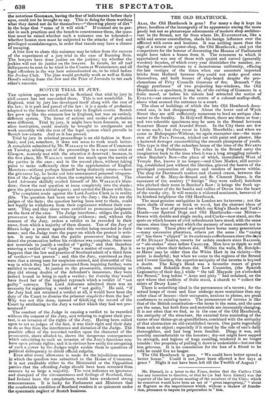SCOTCH TRIAL BY JURY.
THE opinion appears to prevail in Scotland that trial by jury in civil causes has not succeeded there. This is not wonderful. In England, trial by jury has developed itself along with the rest of the law ; it is part and parcel of the law : it is a mode of probation adapted to the forms which actions take in English courts. Scotch law grew up like the common law in England, but was an entirely different system. The forms of actions and modes of probation were different. Trial by jury, it might have been foreseen, as an alien institution, could scarcely be brought to amalgamate and work smoothly with the rest of the legal system which prevails in Scotch law-courts. And so it has proved.
Trial by jury in criminal proceedings is an old fashion in Scot- land; and yet, somehow, it does not seem to work much better. A complaint submitted by Mr. WALLACE to the House of Commons on Tuesday, arising out of the proceedings in a rape case tried at Glasgow, scarcely met with the attention it deserved : because, in the first place, Mr. WALLACE rested too much upon the merits of the parties in the case ; and in the second place, without taking ' pains to make sufficiently clear to the apprehension of English Members—without perhaps himself being distinctly aware—where the grievance lay, he broke out into unmeasured personal vitupera- tion of the Judge against whom the complaint was directed. The Lord Advocate skilfully availed himself of Mr. WALLACE'S blun- ders; threw the real question at issue completely into the shade ; gave the grievance a trivial aspect ; and carried the House with him. The complaint made against the Lord Justice Clerk is in reality this. The question had been sent to the Jury ; the Jury are the judges of the facts ; the question having been sent to them, could not legally be withdrawn from their cognizance without their con- sent. They and they alone were entitled to pronounce judgment on the facts of the case. The Judge interferes ; obliges the public prosecutor to desist from adducing evidence; and, without the consent of the Jury, orders a verdict to be recorded in their name, from which a majority of them dissent. Ten of the Jury of fifteen lodge a protest against this verdict being recorded in their name ; and the Judge tears the paper on which the protest is writ- ten. It may be said that the public prosecutor having aban- doned the prosecution before his evidence was complete, there were not materials to justify a verdict of "guilty," and that therefore entering a verdict of "not guilty " was a matter of course. But it happens that the law and practice of Scotland admit of a third form of verdict—" not proven" ; and this the Jury, convinced as they were that a strong case for suspicion existed, and distrustful of the way in which they had been prevented from inquiring further, were entitled to return. In justice to the prosecutrix, entertaining as they did strong doubts of the defendant's innocence, they were indeed bound to bring in such a verdict ; for thereby they would have freed her of the implied reproach which a verdict of "not guilty " conveys. The Lord Advocate admitted there was no necessity for registering a verdict of "not guilty." He said, "if the Jury had not returned a verdict at all, it would have been the duty of the Court to dismiss the prisoner simpliciter from the bar." Why was not this done, instead of falsifying the record of the Court by attributing to the Jury a verdict which they had not pro- nounced ?
The conduct of the Judge in causing a verdict to be recorded without the consent of the Jury, and refusing to register their pro- test, is an invasion of the rights of the Jury. Having been called upon to act as judges of the fact, it was their right and their duty to do so free from the interference and dictation of the Judge. The possible effect of the recorded verdict upon the character of the prosecutrix, above alluded to, shows the dangerous consequences which submitting to such an invasion of the Jury's functions may have upon private rights ; and it is obvious how easily the arrogating of such a power by the Judges might enable them in questions of political delinquency to shield official culprits. Even after every allowance is made for the injudicious manner in which the question was submitted to the House of Commons, it is not creditable either to the Ministerial or the Opposition parties that the offending Judge should have been screened from censure by so large a majority. The vote indicates an ignorance and disregard of the circumstances and feelings of Scotland, that, had Ireland been the complainant, would have awakened strong remonstrances. It is lucky for Parliament and Ministers that the comfortable condition of Scotland renders it so quiescent under the systematic neglect of Scotch business.


























 Previous page
Previous page